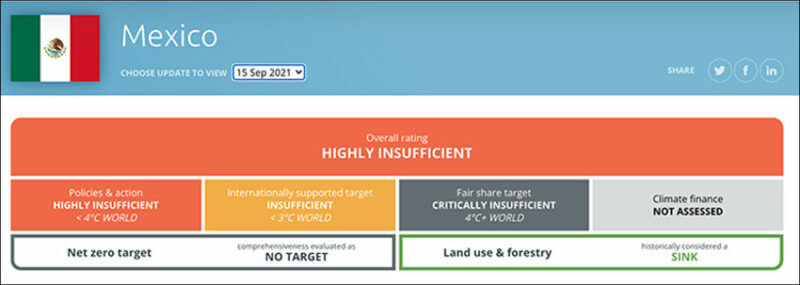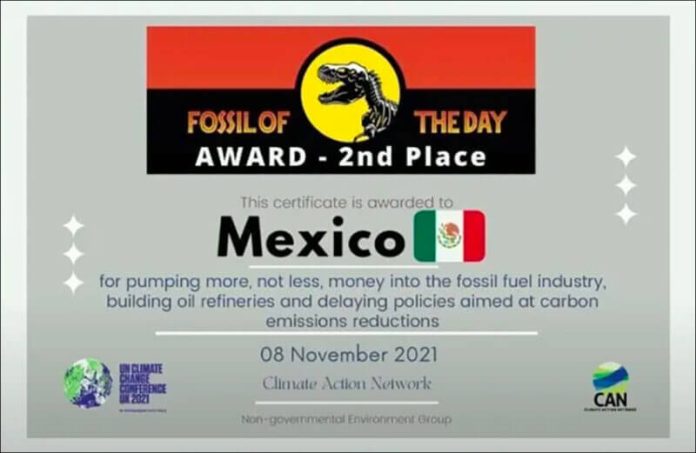Mexico won an unenviable second place Monday in a daily contest held at the United Nations Climate Change Conference in Glasgow, Scotland.
Presented by the Climate Action Network (CAN), a global network of more than 1,500 civil society organizations in over 130 countries, “Fossil of the Day” awards are given to the countries that are “doing the most to achieve the least” in terms of the progress on climate change.
Mexico was awarded second place “for pumping more, not less, money into the fossil fuel industry, building oil refineries, and delaying policies aimed at carbon emissions reductions.”
In a press release, the CAN said that “Mexico has worked hard to earn its Fossil of the Day award.”
“Ranked as the 13th largest emitter of CO2 in the world, it’s not exactly spearheading energy transition,” it said.

The network insinuated that Mexico’s inaction on climate is confounding given that “in 2020 alone, at least 101,000 people were forcibly displaced because of natural disasters, according to the annual report of the Internal Displacement Monitoring Center.”
It said that Mexico “turned up in Glasgow with out of date NDCs [nationally determined contributions] from 2015, previously rated as ‘insufficient’ to achieve the 1.5 C degree goal and with no loss and damage or emissions mitigation data.”
“And surprise, surprise, they also failed to support the recent ‘Global Coal to Clean Power Transition’ Statement which championed a just and inclusive transition to prevent loss and damage and human rights violations they’ve been linked to,” the CAN said.
“They’ve now fallen even further behind with a rating of ‘highly insufficient’ on their climate policies. How much further can this country slide?”
The highly insufficient rating comes from the Climate Action Tracker (CAT), an independent scientific analysis that tracks government climate action and measures it against the globally agreed Paris Agreement aim of holding warming well below 2 C, and pursuing efforts to limit warming to 1.5 C.
“The ‘highly insufficient’ rating indicates that Mexico’s climate policies and commitments are not consistent with any interpretation of a fair-share contribution and lead to rising, rather than falling, emissions, with an exception being Mexico’s conditional NDC target, which roughly stabilizes emissions at today’s level,” the CAT said.
“… Mexico’s plans to not increase its 2030 mitigation ambition are contrary to the Paris Agreement’s requirement that each successive NDC should represent a progression on their mitigation efforts. This sends negative signals to the international community that Mexico is not serious about its commitment to reduce GHG [greenhouse gas] emissions in line with the Paris Agreement climate goals.”
The CAT noted that “in the midst of the pandemic, the Mexican Ministry of Energy published a bill (fast tracked due to COVID-19) that would effectively halt private renewable energy investment in the country, prioritizing the government’s own aging, fossil fuel-fired power plants.”
“… The decision to favor fossil fuel generation over renewable energy now puts Mexico on a path that is even more inconsistent with the steps needed to achieve the Paris Agreement’s 1.5 C limit. Its plans for the power sector – especially the decision to continue investing in coal – stands in stark contrast to what is required to achieve the 1.5 C limit.”
Among the other countries that have “highly insufficient” CAT ratings are Canada, Australia, Argentina, Brazil, India and Saudi Arabia.
Edging out Mexico in Monday’s “Fossil of the Day” award were the United Kingdom (which has an “almost sufficient” CAT rating) and Saudi Arabia. Those two countries shared first place “for their sterling efforts in securing a weak new Work Program on Action for Climate Empowerment, which we’re now going to be lumbered with for the next decade!”
Mexico News Daily
